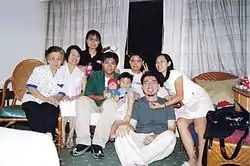ģimene
See also: ģimenē
Latvian

Ģimene

Ģimene
Alternative forms
- (obsolete form) dzimene
Etymology
Borrowed from Lithuanian giminė̃ (“family; kin; genus; gender”), ultimately from the same Proto-Indo-European as the verb dzimt (“to be born”) (q.v.); cf. also Sudovian gimna (“family; uncles, their wives”). This borrowing is first attested in writings in the 1870s, with a broader range of meanings (“family, kin, generation, sex, gender”); the current meaning of “family” stabilized at the beginning of the 20th century. In the 1870s, Juris Alunāns attempted to correct it to dzimene (which would be the regular development if the word had not been borrowed), but this form never became popular. It replaced the previous borrowing famīlija (from German Familie).[1]
Pronunciation
- IPA(key): [ɟimɛnɛ]
Noun
ģimene f (5th declension)
- family (group formed by a couple and their children (if any) living together; larger group of relatives living together)
- daudzbērnu ģimene ― large (lit. many-children) family
- strādnieku ģimene ― worker's family
- zemnieku ģimene ― peasant family
- mazas ģimenes ― small families
- saskanīga ģimenes dzīve ― harmonious family life
- ģimenes stāvoklis ― marital status (lit. family state)
- ģimenes budžets ― family budget
- ģimenes galva ― head of the family (= the family's breadwinner)
- ģimenes māja ― family house
- ģimenes cilvēks ― married (lit. family) person, (usually a man)
- ģimenes tiesības ― family law (legislation concerning marriage, kinship, adoption, etc.)
- mūsu ģimene ir liela: tētis, māmiņa un septiņi bērni ― our family is big: father, mother and seven children
- A. Upīts romānā “Jauni Avoti”, tēlojot konfliktus starp Robežnieku ģimenes locekļiem, atspoguļo tam laikam raksturīgos konfliktus patriarhālās ģimenes iziruma apstākļos ― A. Upīts depicting in (his) novel “New Sources” the conflicts between the members of the Robežnieks family also portrayed the conflicts, typical of those times, in the process of disintegration of the patriarchal family
- (livestock) a group of female animals descended from one breeder
- šodien pārrunā sevišķi aktuālas tēmas: aminoskābju palielināšana cūkgaļā, līniju un ģimeņu analīzes un citas svarīgas problemas ― today (they) discussed especially current issues: the increase of aminoacids in pork, the analysis of lines (= lineages) and families, and other important problems
- (zoology) family (a group of animals consisting of a male, a female and their offspring, living and eating together)
- stārķu ģimene ― stork family, family of storks
- mežacūku ģimene ― wild boar family, family of wild boars
- tas, ko parasti uzskata par vilku baru, īstenībā ir viena vilku ģimene: veco vilku pāris un viņu šā gada un pērnie vilcēni, kas ziemas sākumā sanāk kopā ― that which one usually considers a pack of wolves is actually a family of wolves: an old wolf couple and their wolflings of this year and of the previoius year, who get together at the beginning of winter
Declension
Declension of ģimene (5th declension)
| singular (vienskaitlis) | plural (daudzskaitlis) | |
|---|---|---|
| nominative (nominatīvs) | ģimene | ģimenes |
| accusative (akuzatīvs) | ģimeni | ģimenes |
| genitive (ģenitīvs) | ģimenes | ģimeņu |
| dative (datīvs) | ģimenei | ģimenēm |
| instrumental (instrumentālis) | ģimeni | ģimenēm |
| locative (lokatīvs) | ģimenē | ģimenēs |
| vocative (vokatīvs) | ģimene | ģimenes |
Synonyms
References
- Karulis, Konstantīns (1992), “ģimene”, in Latviešu Etimoloģijas Vārdnīca (in Latvian), Rīga: AVOTS, →ISBN
This article is issued from Wiktionary. The text is licensed under Creative Commons - Attribution - Sharealike. Additional terms may apply for the media files.